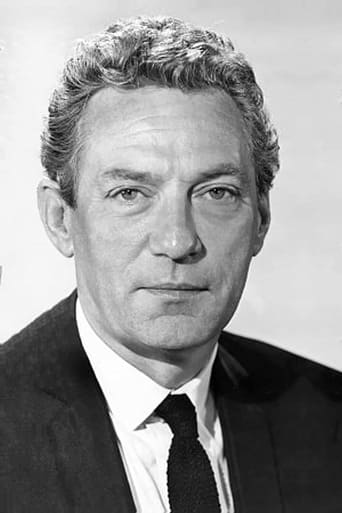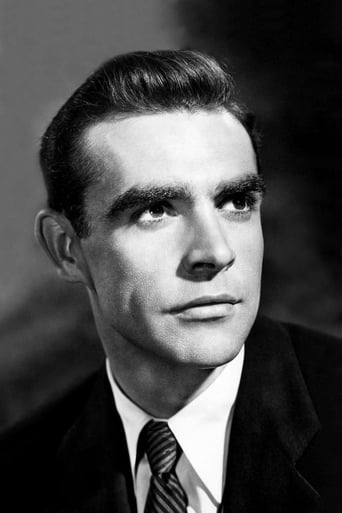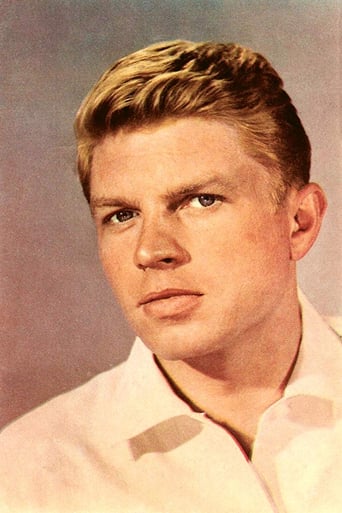Exoticalot
People are voting emotionally.
Beanbioca
As Good As It Gets
ChanFamous
I wanted to like it more than I actually did... But much of the humor totally escaped me and I walked out only mildly impressed.
Invaderbank
The film creates a perfect balance between action and depth of basic needs, in the midst of an infertile atmosphere.
keachs
I looked up this little-known gem because the director Mikhail Kalatozov had also directed Letter Never Sent. Though the story is a bit hard to follow, since it is told as a recollection and an imaginary reunion of the principals involved. The cinematography is outstanding, capturing the desolateness and starkness of the arctic, along with a haunting soundtrack. The cast is very solid, the story - true life outweighs fiction. I have always found films dealing with survival in the elements to be fascinating. This film keep the viewer engrossed, without resorting to cheap dramatics, or sentimentality. Just solid filmmaking.
mformoviesandmore
Wow. After a fortnight of seeing movies that were mostly interesting but a little disappointing (Skyfall, Looper, Sahara, The Cabin in the Woods) I was fortunate enough to come across The Red Tent.And what a refreshing change.A good range of character actors, each allowed enough screen time for us to understand who they are and what they mean.Real special effects, not CGI. OK, some of the ice breaking scenes may be from stock footage but they clearly show real activity.And the style of the movie is made interesting by the combination of English speaking actors in an Italian-Russian co-production. I found myself captivated by the story telling and wanting, now, to find more like it. Unfortunately the IMDb "People who like this also liked" feature doesn't seem to be working here.Probably more of a guys movie than a general interest movie. The issues raised are something every man will be able to relate to.
petra_ste
The Red Tent gives a fictionalized account of the ordeal faced by the crew of airship Italia, which in 1928 crashed on the North Pole; among survivors are general Nobile (Peter Finch), second-in-command Zappi (Luigi Vannucchi), radio operator Biagi (Mario Adorf) and scientist Malmgren (Eduard Martsevich). Nobody knows their position and ice starts to break. Meanwhile, explorer Amundsen (Sean Connery), Nobile's friendly rival, and Malmgren's fiancée (Claudia Cardinale) react to the tragedy.Structure is unusual. The story is told in flashbacks as a conflicted Nobile confronts the ghosts of his past in a dreamlike trial. It's peculiar and a little kitsch but effective, culminating in a memorable moment where Nobile, pressed by Amundsen, recalls his main motivation behind a key choice.The most interesting characters are Nobile, portrayed by Finch as a man haunted by his decisions, and Connery's Amundsen, who has a relatively small but crucial role. Cinematography is solid; Morricone's haunting soundtrack - one his best works, and that's no small feat - conveys the epic, bittersweet mood of the movie.8/10
aimless-46
Since viewing this film 35 years ago I have been in awe of it, it is certainly my all-time favorite and would most likely get my nomination for best film ever. On this point I probably stand in splendid isolation (or to quote Finn Malmgren: "emptiness, loneliness, beauty, and purity"). I mention this in the hope that this will encourage readers to view the film. If you are seeking a comparison, "Krasnaya Palatka" ("The Red Tent") is most like the original "Flight of the Phoenix"; both are superficially action adventure films, with deep allegorical elements about the dynamics behind the functioning of a civilized society. "The Red Tent" even gets a little philosophical along the lines of life as a journey and not a destination.This is Director Mikheil Kalatozishvili's tribute to Sergei Eisenstein, a disorienting yet organized montage of vast scale juxtaposed with claustrophobic confinement (its worth watching again just to focus on the scene transitions-the editing is brilliant). The scenes inside the dirigible and the red tent (the title character) are carefully cut into spectacular exterior shots of arctic landscapes and the dynamic energy of crowds in the Russian countryside and city. There is a fusion of European expressionism with Hollywood realism in this film unlike anything I have ever seen before. This is possible because of the storytelling device of having everything unfold in flashbacks by the main character General Nobile (Peter Finch). Nobile was the organizer and commander of Italy's ill-fated attempt to reach the North Pole by dirigible. This generally true (certain historical liberties are taken to simplify things) story is told entirely from his point of view. Forty years after the expedition Nobile is a disgraced figure living in Rome and burdened by guilt and sleeplessness. You learn that on sleepless nights he conjures up participants in the expedition fiasco (both members and rescuers), letting them judge him for his actions 40 years ago. These sessions have been largely inconclusive but this night he pulls out all stops and convenes a full trial in his living room-with almost all the central figures present. More importantly, for the first time he names the ruthless Lundborg (Hardy Kruger) as his prosecutor-a move that Lundborg assures him will mean that the jury will reach a verdict for the first time. These are not ghosts but rather figments of Nobile's imagination and they behave according to his perception of how they would behave. This storytelling device allows the film to have its own commentary, making it not just an exciting adventure film with wonderful visuals, but an examination of the concept of leadership (much like "Command Decision", "A Gathering of Eagles", and "They Came to Cordura"). More importantly it becomes an allegorical study about free will and destiny, as careful planning and good judgment are just two factors in any complex operation; subject to luck and unforeseen events.The many characters are a representative cross section of society; with heroes, opportunists, martinets, dreamers, and average Joes. Ultimately, things happen (both good and bad) not because of the challenge of man versus nature, but because of the placement and misplacement of human resources (i.e. the right or wrong person assigned to a particular role in the expedition and the rescue efforts). From the events portrayed in the "The Rent Tent" it is difficult to fault Nobile as a leader. He wisely turns back to Kings Bay when the weather gets bad, he is genuinely devastated at the loss of some of his men, and his actions after the crash are all reasonable. He can be blamed for allowing Lundborg to bring him out before his men but under the circumstances it was a sensible decision if not a politically correct one. As Samoilovich, Captain of the Russian Icebreaker Krassin points out, a leader is judged by their actions, and their actions by their results, Nobile's early rescue is the reason the other surviving crewmen are ultimately rescued.Nobile's fantasy trial eventually dredges from his subconscious the realization of why he choose to leave with Lundborg (1000 reasons to stay-1001 to leave). That such a trivial and self-indulgent reason was the difference maker accounts for his continuing guilt. This realization, along with the belief that Amundsen (his peer) is the only one fit to judge him, allows Nobile to finally forgive himself for being human. They go out with Amundsen's advice to reflect not on their failures but on the things they attempted and the wondrous things they saw. There is no guilt in not achieving an ambitious goal, making the attempt is more important than succeeding. The music is also great.Then again, what do I know? I'm only a child.




